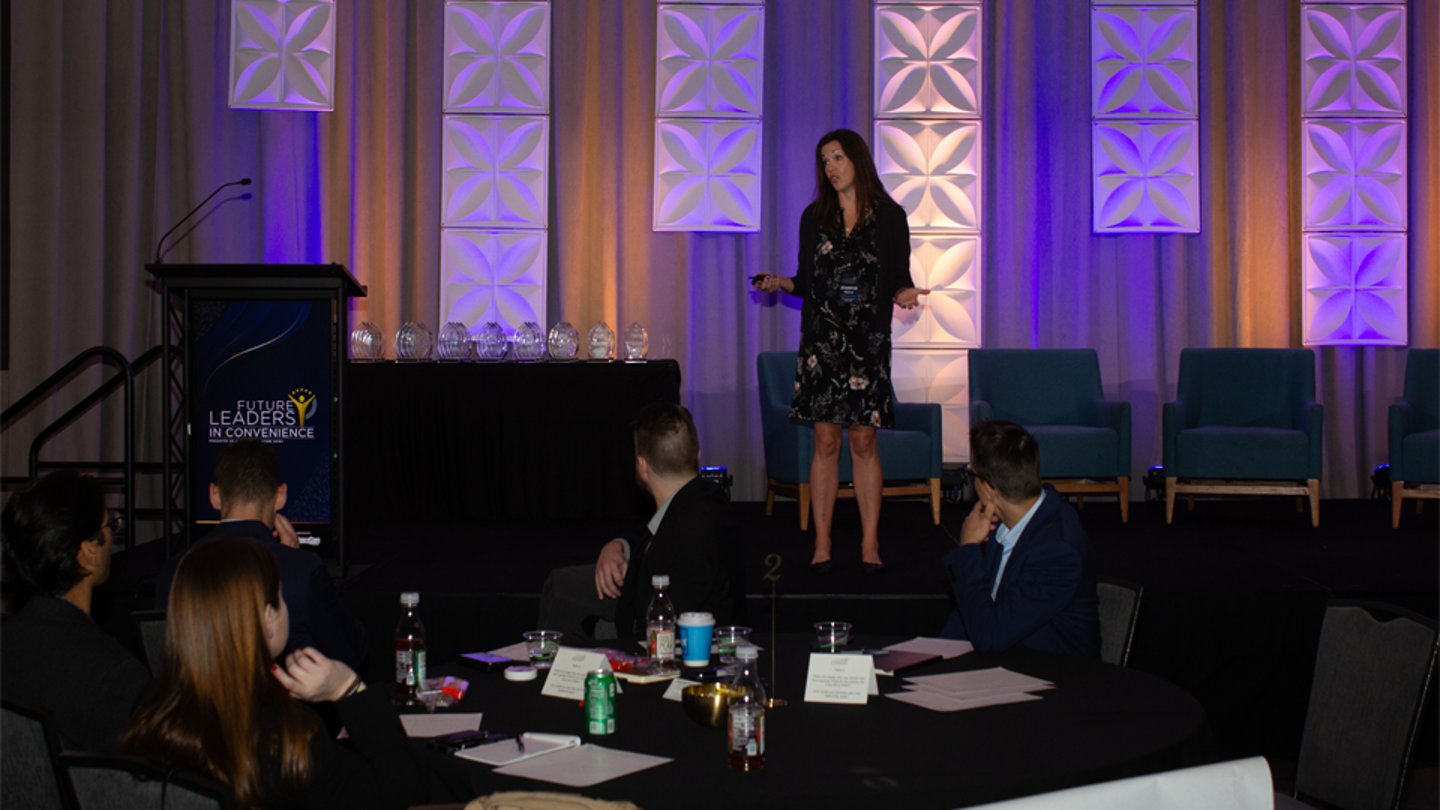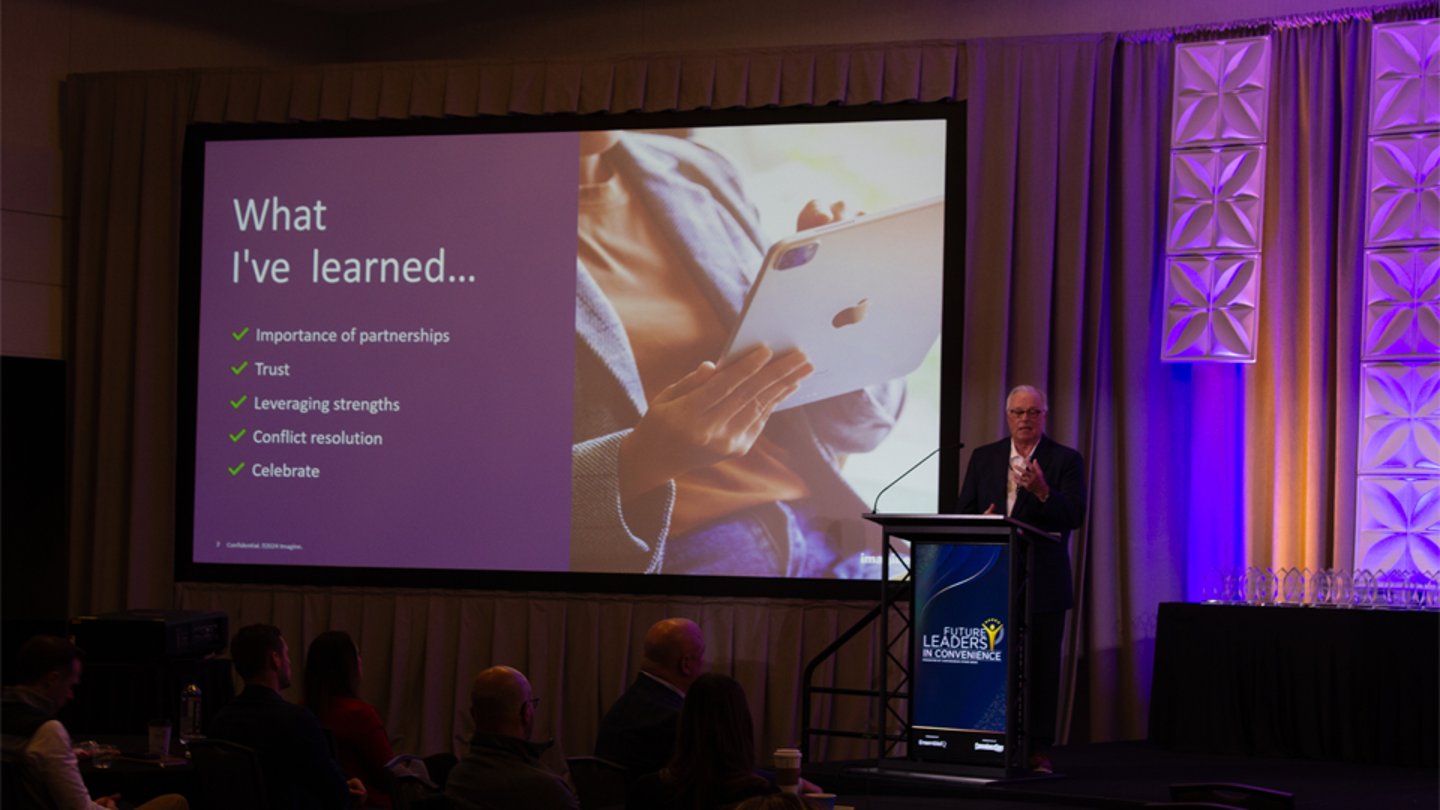Honing Your Leadership Style Is Central Theme of 2024 Future Leaders in Convenience Summit
DES MOINES, Iowa — Convenience Store News' 2024 Future Leaders in Convenience (FLIC) Summit, held last month at the Hilton Downtown Des Moines, brought together up-and-comers in the convenience store industry for professional development, networking and recognition.
The seventh-annual event featured the presentation of this year's Future Leaders in Convenience Awards, which honored a record class of 49 young, emerging leaders from retailer, distributor and supplier companies in the c-store industry. The FLIC Awards recognize the achievements of industry rising stars, aged 35 or under at the time of their nomination.
This year's Future Leaders in Convenience Summit also provided education and networking opportunities to attendees. The event kicked off with Music Bingo and continued the next day with a panel discussion featuring CSNews' 2024 Hall of Fame honorees, as well as an interactive workshop led by leadership coach and trainer Jen Recla. The conference also featured roundtable discussions and a session examining the power of partnerships.
Leaning Into Leadership
"The Secrets of Successful Leaders" panel discussion included 2024 retailer Hall of Fame inductee Darren Rebelez, chairman, president and CEO of Casey's General Stores Inc.; supplier Hall of Fame inductee Kimberli Carroll, president and CEO of Ruiz Food Products Inc.; and Retailer Executive of the Year Chuck Maggelet, the recently retired CEO and Chief Adventure Guide of Maverik — Adventure's First Stop.
When stepping into chief executive roles and having oversight of numerous employees and different personalities, each panelist said they had to uncover their unique leadership style to help guide their organizations.
For Carroll, her approach is more democratic. "I like to seek consensus with my team. It doesn't always work out and sometimes you just have to make the executive decision and move on. But I really like working with teams to solve problems and I'd much prefer empowering the team to go out and find the solutions than them expecting me to have all the answers," she said.
Similar to Carroll, Rebelez's leadership style is team-oriented in that he believes when the organization wins, it wins as a team. When it loses, it loses as a team.
"I always try to let people do their thing and be there to support them. Everybody's going to need something and need some help along the way," he expressed. "I feel, as a leader, it's my responsibility to give our people the things that they need to be successful in their roles."
Maggelet has found guidance in the old adage, "Be yourself because everyone else is taken." He told the audience that it's imperative to determine what core values are most important to them and adapt a leadership style that is comfortable and authentic to them.
"[At Maverik,] we call it the 'Titanium Rule,' which is to treat others better than they expect to be treated. And I think that one of the most valuable things that we can do is make sure that we are, in fact, treating others better than they expect to be treated," he explained. "It works great in our family lives. It works amazingly well in our community lives. It works even greater in our organizational lives and obviously for any customer service organizations, it's crazy important as well."
The accomplished, veteran leaders provided insight and guidance on an array of other topics, too, such as:
Lead by listening — "I think that's a key function as a leader to put the right people in the right jobs. It's about not tolerating the bad behavior — especially as a CEO — because not doing anything with bad behavior is endorsement of that, and that can poison the culture faster than anything. So, I think it's really important to get the right team on the bus, put them in the roles to be successful and hold a high standard with values so that it doesn't get undermined," Rebelez said. "Have you heard the expression, 'God gave you two ears and one mouth. Use them in proportion?' I'm a big believer in listening more and talking less. I think you'll be far more effective."
Make connections — "It's true for anyone, but especially when starting your career young, you feel like you don't have the education, experience or the credentials to take on the next role. But you need to lean in and really push on making yourself as viable as possible by connecting with the right people. There's always going to be people who know more than you do in one area or another. So, take a step back and focus on what you need to do to move forward," Carroll advised.
Ask questions and accept feedback — "I think it's pretty important for leaders to be open and to hear the truth. I like to say, news doesn't get better with age. You want to find out things quickly, so you can make sure and get ahead of it. I remember an early conversation with a new direct report who was super talented, super creative and super effective. This individual was maybe the most loyal person I ever met and I think he was so excited to show his loyalty to me. But I'm like, no, no, no. I don't want that. I want to know what's going on," Maggelet shared. "So, be a leader who asks questions, listen intently for where the opportunities are and seek out others to get them involved with solving problems. I think those are the ways that you build both teams and the entire organization over a long period time."
Uncovering Your Leadership Style
What does it look like to be part of an engaged, collaborative and resilient team?
Citing Gallup data, Recla shared that almost seven in 10 employees (67%) who strongly agree that their manager focuses on their strengths or positive characteristics are engaged. When employees strongly disagree with this statement, the percentage of workers who are engaged in their work plummets to 2%.
"We know that when your employees are highly engaged ... they're more productive, they're going to stick with the company longer, they're going to show up to work and they're going to be active in the work that they do," she told the group.
In an interactive session titled "Getting the Best Out of Yourself & Others," Recla led the FLIC Summit attendees through a workshop aimed at helping them discover their preferred leadership communication style and then figuring out how to leverage those insights to enhance their leadership effectiveness.
She urged the emerging leaders to adopt a strengths-based approach to effectively lead their teams. The basic concept of a strengths-based approach is identifying individuals' strengths, identifying the strengths of the team, and then working out how to best collaborate and delegate work according to individual strengths.
Taking a strengths-based approach involves:
1. Embracing a People-First Mentality
When we step into a space where we look at people as barriers or objects, we diminish their needs, wants and challenges. But, when we lead with a people-first mentality, we build trust and authentic connections by leaning into empathy.
Leaders should ask themselves: Am I seeing this individual as a person or object? What can I better do to recognize their needs, objectives and challenges?
"There is a common misconception that when we step into a people-first place, we need to be self-sacrificing. That's not true," Recla emphasized. "What you're saying is in this space, my needs, my challenges, my objectives are just as important as yours. I’m holding equal weight."
2. Cultivating a Growth Mindset
A growth mindset involves embracing challenges, viewing failure as a stepping stone rather than a roadblock, and continually developing one's skills and intelligence. A leader can strengthen their growth mindset by creating a culture of feedback.
"Stepping into a growth mindset is really foundational for then driving the behavior, the actions and the results that you want to see," Recla said. "A growth mindset space ... just really shows the power for all of us to evolve. No matter where we're at, we all have the ability to transform, to grow our skin, grow our skills and succeed."
Building Partnerships That Work
Whether a current leader or an aspiring one, building partnerships is key to success — in personal lives, with teams and with business partners.
By focusing on trust, leveraging each other’s strengths and resolving conflicts smoothly, we can create strong, mutually beneficial relationships that drive growth and innovation. That was the message from The Imagine Group CEO Don McKenzie.
He used the relationship between him and his wife of 45 years as an example of a foundational partnership. The couple, he shared, recognizes and harnesses the individual strengths they each possess to benefit and complement each other and, most importantly, develop a partnership that works for both of them.
There are similarities between personal partnerships, like a marriage, and the partnerships formed in business, according to McKenzie.
"I think if we look at business today, the most important thing really is to find people you can work well with. Find people that have similar core values to you; they care about their fellow employees, they care passionately about their clients. They're good vendors," McKenzie emphasized. "We built a very strong business that we can grow year in and year out. And, you know, at the end of the day, we have to be profitable and we have to find ways to develop talent. But as I've gone through my career, what I've realized is the value of a good partnership is critical."
Supporters of the 2024 Future Leaders in Convenience Summit were founding and presenting sponsor Reynolds American Inc.; gold sponsor The Imagine Group; and silver sponsors The Hershey Co., Keurig Dr Pepper, McLane Co. Inc., Patron Points and PDI Technologies.






